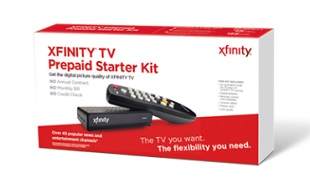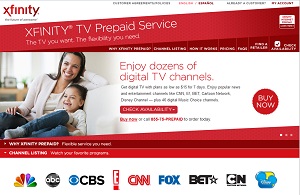Comcast Flips On Prepaid TV Test in Detroit
The smarter way to stay on top of the multichannel video marketplace. Sign up below.
You are now subscribed
Your newsletter sign-up was successful

Comcast has quietly begun to test a new prepaid TV product in metro Detroit led by a $69.95 starter kit that includes a digital transport adapter, remote control and 30 days of a video service that includes an ESPN-free lineup of 36 digital TV channels.
The service, only available to consumers in Detroit who do not currently have an “active billed-service account” with the MSO, could give Comcast a low risk opportunity to target a segment of the population that doesn’t have a bank account, has previously been turned off due to non-payment, or otherwise does not qualify for the MSO’s post-paid subscription TV product. The no-contract Xfinity TV Prepaid service does not require a credit check or ask the customer to provide a Social Security number. Comcast launched the trial this week, a spokeswoman said.
If successful, Comcast’s prepaid TV service could provide a much-needed spark to a service category that continues to shed subscribers. Comcast lost 159,000 video subs in the second quarter of 2013, giving it a total of 21.77 million. The MSO is already trying to attract the high end of the market with X1, an IP-capable service that is being marketed to new triple-play customers.
According to a Web site dedicated to the new trial, customers who take the pay-as-you-go TV service can refill in increments of seven days for $15 or 30 days for $45 using a credit, debit or specialized prepaid card online at xfinityprepaid.net, or by calling 855-75-PREPAID. That approach follows closely with Comcast's prepaid Internet service trial.
Comcast’s prepaid TV test in Detroit currently offers a lineup of 36 TV channels, including NBC, ABC, CBS, PBS, The CW, AMC, E!, Discovery, CNN, Fox, BET, Cartoon Network and Disney Channel, plus 46 digital music channels from Music Choice. Absent from the lineup are sports networks such as ESPN, ESPN2, Comcast Sportsnet, Golf Channel, and NBC Sports Network, as well as Comedy Central, Syfy, MTV, Bravo, and Nickelodeon.
In terms of the channel lineup, Comcast’s prepaid offer in Detroit is most closely aligned to its Digital Economy TV postpaid tier, which sells for $29.95 to $39.95 per month, depending on the market. Prepaid TV customers also have the option to get Comcast’s MultiLatino Extra video package, a spokeswoman said.

Comcast is using a DTA to run the prepaid service – the same kind of downstream-only device that Comcast has used to fuel its analog-reclamation strategy. It was not immediately known which vendor is supplying the DTA for the trial, but Arris, Pace and Technicolor are Comcast’s primary suppliers for the device.
The smarter way to stay on top of the multichannel video marketplace. Sign up below.
Because it lacks an upstream path, DTAs inherently do not support Comcast’s VOD service. DTAs also do not currently support premium services such as HBO, Showtime and Starz. Comcast’s prepaid trial is starting off as a standard-definition-only service. SD-DTAs typically sell for less than $35 per unit, while newer HD versions fetch less than $50 in volume, according to industry sources.
A Comcast spokeswoman said the MSO is conducting the test to gauge interest in the prepaid approach and has not announced any plans to expand the trial beyond the Motor City. Detroit filed Chapter 9 bankruptcy protection on July 19.
Like Comcast’s Internet trial, the TV version of Comcast’s prepaid platform relies on a self-install kit, which also includes the required cables and two AA batteries for the remote control. After the DTA is connected, customers must call Comcast to activate it and create a PIN for future account access.
The features, pricing and limited availability of the prepaid product have likely been tailored to ensure that it will not cannibalize Comcast's postpaid subscription base.
Comcast has not discussed the sales performance of its prepaid Internet trial, which started in the Philadelphia area, but has since been extended to eligible homes in most of its markets. Comcast likewise has not talked about the size of the addressable market for its prepaid test products.
According to a report issued by the Federal Deposit Insurance Corporation (FDIC) last fall, nearly 10 million U.S. homes were “unbanked” in 2011. More than one in four homes (28.3%) were either unbanked or underbanked, meaning they “conducted some or all of their financial transactions outside the mainstream banking system,” which includes “alternative financial services” such as payday loans, pawnshops and non-bank check cashing services.
